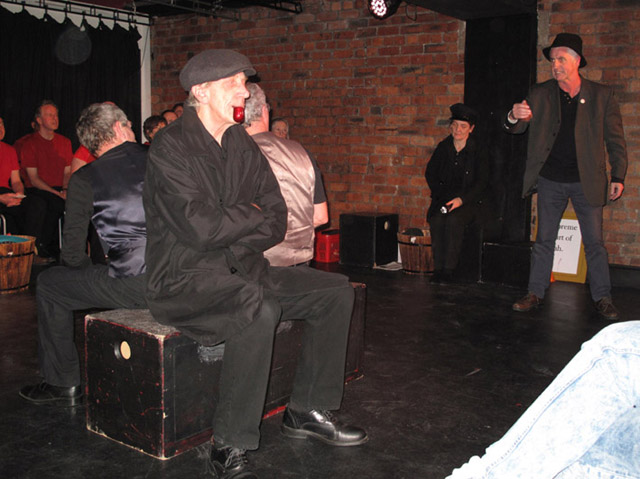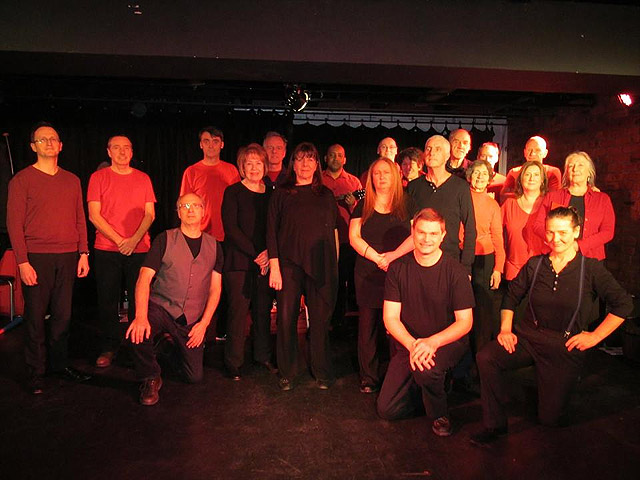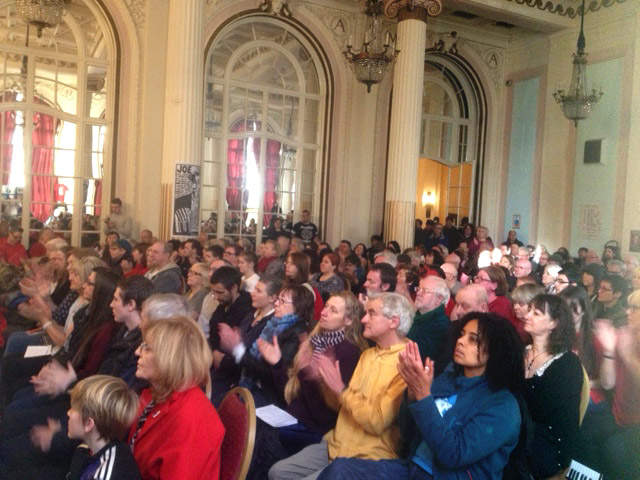A Review of an Afternoon’s Free Events to Celebrate His Life
Adelphi Hotel, Liverpool, 21st November 2015
Supported by GMB (who also provided a TU Bill info sheet), Liverpool TUC, North West TUC, Simpsons Solicitors, Unison and Unite.
‘True to its mission as the pioneer movement of the newer time, it advocated perpetual war on, and the total abolition of the system of wage slavery that blights humanity’. James Larkin on the IWW
Written by Minnie Stacey
Photographs by John Flannagan and Helen Capstick
Writing in the International Socialist Review of December 1915, James Larkin railed against the murder of Joe Hill who was executed on 19th November that year: ‘Shot to death because he was a member of the fighting section of the American working-class, the Industrial Workers of the World’. Joe Hill was a creative campaigner, a union activist, free speech agitator, songwriter, cartoonist, satirist and poet, so it was fitting that 100 years later Liverpool’s News from Nowhere radical bookshop and Nerve Magazine chose to organise a celebration of his life by staging John Fay’s play ‘The Joe Hill Dream’ in an afternoon of rhyme, reason and song.
In a vicious circle of history, Joe Hill’s story is like a fairground mirror image of the monster economy we fall prey to today, amid a clampdown on collective bargaining and the criminalisation of protest in the form of the Trade Union Bill.
On the eve of his death, Joe called on fellow workers not to mourn but to organise. Legend has it that ‘he ain’t dead’, and today it was our host Eithne Browne’s fun and warmth that brought his reputation into the room. ‘Isn’t this a wonderful predicament we find ourselves in,’ she laughed, referring to the seated audience having almost doubled, with the turf of the springy red carpet pushing up a crowd for standing room only, and more in the doorway of the Derby room at the Adelphi Hotel. ‘Those forcibly stood up against the wall will be held in by tape,’ she joked, apologising for the ten-minute popular delay to starting the show.
Eithne introduced our rebel hero as Joe Hillstrom. Brought up in poverty in Sweden, he emigrated to America where he lived a varied hobo-life. Often blacklisted for union activity, this itinerant troubadour moved from state to state to get work. His dream was to emancipate the working class and declare industrial freedom. He first came to the attention of the police for his involvement in the San Pedro Dockworkers strike. ‘Joe had a thing about singing’, Eithne declared, waving the little red song book we’d all picked up from Nerve’s trestle table at the back of the room. He figured that ‘More people would take more note of fifty men singing together, more than they would of one man railing in the joint,’ she twinkled. The thought behind the Wobblies’ one big union, IWW, was not to recognise and do deals with the bosses or ape their system as paid professionals, but that together workers themselves could organise and change things, and also mobilise immigrants and the people other unions didn’t want.

Joe occupied and took over other people’s songs with lines like ‘Nearer my job to me!’ Believing in a paradise on earth for workers, he coined the phrase ‘Pie in the sky’ in his song ‘The Preacher and the Slave’, satirising the smug advertising of a compensatory afterlife by ‘The Starvation Army’. In this spirit, Arthur Adlen took to the stage first, strumming his guitar to lyrics about a life going down the drain on benefits in Birkenhead, ‘The Bailiffs Took it all’. His words to the tune of a Traveling Wilburys’ number went ‘We’ll have no rights with the TU Bill, one word speaks out from history – solidarity, we’ll have no rights – you can’t say S C A B!’
Next, Liverpool’s Socialist Singers filled up the stage, all dressed in red like one voiced and visceral flag. They’d lost one of their ranks, anti-fascist campaigner and folk singer Fred McCormick, in the days running up to the show and dedicated their performance to him with a minute’s silence. Accompanied by a piano accordion, their passionately activist harmonic platform aired ‘Solidarity for ever, for the union makes us strong,’ to the tune of ‘Glory Glory Hallelujah’. ‘A union maid who never once was afraid’ followed, then ‘I dreamed I saw Joe Hill last night, alive as you or me – says I, but Joe you’re a century dead, I never died said he’.
Eithne introduced John Fay’s play ‘The Joe Hill Dream’, setting his murder in the tragically capitalist context of the trial’s testament that, as a member of the IWW, Joe Hill had no right to live anyway. She welcomed the players on stage, an ensemble from Dingle Community Theatre and Vauxy Theatre, supported by Liverpool Socialist Singers and Liverpool LGBT Choir singing more Joe Hill songs to the side. With our disbelief unsuspended, we were treated to a comically Brechtian busy-stage perspective on injustice – a self-referential, epic, musical spree where the mean and mercenary meme of a working-class turned against each other and stitched up by the rich, came loud and clear from history to match the here and now.
Hats, wigs, dark-glassed state menace, hope, passion, activism, accents, ‘yups’, ‘goddamns’, speechifying and flags headed in all directions and made for critical mass movement on an open plinth. Joe Hill was back, not dead but still running for that railroad car, his story of solidarity breaking through the frame he was in. Paul Cosgrove highlighted a Joe Hill trapped by a system he could see right through, one that couldn’t stop his vision for a world free from capitalist parasites.
Geraldine Moloney-Judge gave us a stand out performance as Elizabeth Gurley-Flynn, an IWW activist and inspiration to Joe, who wrote to her on his death, saying rebel girl’s like her were ‘needed, and needed badly’. ‘I’ve been robbed by the capitalist system, even our freedom of speech is robbed!’ she shouted. John Fay’s text brought alive the guts, honour and energy of workers born to struggle, beset by rage, torture, lynchings and murder in the name of the same old, age old greedy ownership-class and its lackeys. The writer was overwhelmed to see how many supporters had come to be close to this community fire.
‘Workers of the World awaken!
Break your chains, demand your rights!
All the wealth you make is taken
by exploiting parasites…’
In the interval, there were hot mugs of tea and coffee, un-boxed biscuits, a bucket for donations, some Joe Hill keyrings and fridge magnets to buy, and a News From Nowhere IWW-themed bookstall to browse. Afterwards, guitarist and singer Gerry Ffrench said ‘I do think singing does you good’, and sunnily sang her clear-voiced and spot-on songs. One was about money grabbing solicitors, ‘I represent the underdog – it’s usually you’; another starred a stevedore in a dockers’ pen and we all sang the chorus:
‘When you’re standing in a pen me lad, standing in the dockers’ pen,
well the bosses choose and the workers lose,
you’re more like animals than men’.
Gerry finished with a song inspired by Harry Leslie Smith’s speech to Labour conference.
Poet Alison Down delivered her sobering poem about a woman’s experience of a foodbank and lamented the fact that people are now invited to celebrate the opening of these. Alison is a member of Liverpool Friends of Palestine and named murdered Arab children in her poem ‘Whitewash’. She’d been inspired to write a poem about Liverpool Granby’s Four Streets, a community project now up for the Turner Prize. ‘Don’t mourn – keep making noise!’ she shouted, just before she left the stage.
Bernadette Hyland, Christine Clark and Honor Donnelly, introduced their book ‘The Northern Resisters’, pointing to Mandy Vere from News from Nowhere in the audience, telling us ‘She’s one of us too!’ They’d been made up to see the role of Elizabeth Gurley-Flynn given a good profile in the play. The Resisters spoke about their working class roots, gave us stories of the strong women in their families’ recent pasts, and their own backgrounds in union activism. Bernadette got her political education as a shop steward in a radical union branch in Liverpool. Her activist experience included going out on the streets to promote public services in the 1980s.

Christine Clark went to Greenham Common and left the Labour party to join the Greens because ‘It’s more bottom-up’. She campaigns outside jobcentres now, holding memorials for those who’ve died as a result of the cuts, and helping people to overcome benefit sanctions. She highlighted the fact that two thirds of the world’s work is done by women and lamented the lack of recognition for women’s caring responsibilities. ‘Since Tony Blair called young mothers workless we’ve been treated as worthless,’ she said.
Honor Donnelly told us how her Scottie Road gran lost 5 children through poverty, bought shoes from the odd shoe shop and ate thin cabbage soup with salt and pepper whilst feeding those she was in service for well. Her activism comes from a strong response to listening to oral history about people’s lives.
Members of the audience were invited to step up to the microphone. A continued threat of state murder, and the need for a general strike to bring this Tory government down and stop the TU Bill from killing unions, were the first speaker’s concerns. Someone spoke about boycotting Israel and how the TUC backed down from supporting the miners when Arthur Scargill had said they could win. ‘We want decent union leaders who don’t sell out’, he said. Someone else expressed their support for Jeremy Corbyn and drew the audience’s attention to the launch of the grassroots Momentum movement the following week.
A woman recommended divesting from fossil fuel, scaling industries down, ending oil exploration and drilling, and creating green jobs to counter climate change. Another woman spoke about women’s history being poorly chronicled in the union movement – ‘When we try to organise in a union we know that blokes will come forward to do all the gabbing and women will do a lot of the work, so some of the blokes need to take a step back, be supportive and shout about us, not at us!’ she asserted. I urged people to gen up on the geopolitical and pipeline context of the war in Syria and the Middle East, and recommended they read Dr Nafeez Ahmed’s articles on the subject.
Glinting with nous, Jennifer Read melodically aired sweet and funny, hard-hitting acapella folk songs of working-class resilience, of gallant lads from Lancashire, and a young girl slaving in a factory: ‘They say that you grow very rich by little pieces such as me’. We all joined in on the chorus of ‘Tyrants of England’ and a song about northern blokes going to London to visit the queen.
The afternoon ended with Arthur Adlen singing The Joe Hill Dream accompanied by Ritchie Hunter on guitar. All together now: ‘What a world this would be, if things were shared out equally!’ were the notes we rounded the afternoon on…
Anon! Bring it on!
